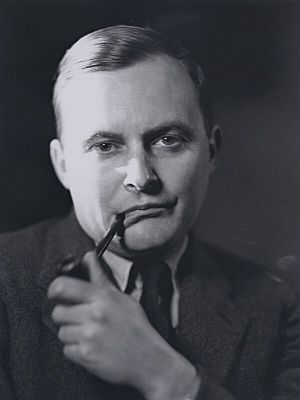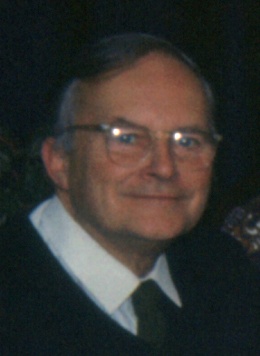Edward Upward facts for kids
Quick facts for kids
Edward Upward
|
|
|---|---|

Upward around 1938
|
|
| Born | 9 September 1903 Romford, Essex, England |
| Died | 13 February 2009 (aged 105) Pontefract, West Yorkshire, England |
| Occupation | Writer, schoolteacher |
| Alma mater | Corpus Christi College, Cambridge |
| Period | 1920–2003 |
| Spouse |
Hilda Percival
(m. 1936; died 1995) |
Edward Falaise Upward (born September 9, 1903 – died February 13, 2009) was a British writer. He wrote both novels and short stories. Before he passed away, he was thought to be the oldest living author in the UK.
Edward Upward first became known for his very imaginative writing style, called surrealism. In the 1930s, he became interested in social change. His writing then shifted to a more realistic style, focusing on everyday life and society. His career as a writer lasted for over eighty years!
Early Life and School Days
Edward Upward was born on September 9, 1903, in Romford, England. His father was a doctor. Edward had three siblings: John, Laurence, and Yolande. Another brother, Harold, died when he was a baby.
In 1917, Edward went to Repton School. There, he became very good friends with Christopher Isherwood. Edward's first writings were published in the school magazine in 1920.
From 1922 to 1925, he studied History and English at Corpus Christi College, Cambridge. When Christopher Isherwood joined him at Cambridge in 1923, they invented a funny, imaginary town called Mortmere. This town was a playful way to make fun of some of the upper-class people they met at the university. In 1924, Edward won a special award called the Chancellor's Medal for English Verse for his poem "Buddha". Through Isherwood, Edward also met and became friends with other famous writers like W. H. Auden and Stephen Spender.
Teaching and Social Interests
Starting in 1926, Edward Upward worked as a teacher in many different places. In 1932, he became an English teacher at Alleyn's School in Dulwich. He taught there until he retired in 1961.
Edward became very interested in social and political ideas. In 1931, he started going to meetings of a group called the Communist Party of Great Britain. He even helped campaign for a candidate in an election. In 1932, he officially joined the party. He also traveled to the Soviet Union and visited his friends Isherwood and Spender in Berlin.
In 1936, he married Hilda Percival. She was also a teacher and shared his interest in social change. They had a son, Christopher, and a daughter. During World War II, Edward's school moved to Cleveleys for safety. From 1942, Edward and Hilda's political activities were looked into by a government agency called MI5.
Edward Upward always believed in working for a better world and for socialism. However, he and Hilda left the Communist Party in 1948. They felt the party was no longer trying to make the big changes they believed were needed.
Edward's first novel, Journey to the Border, was published in 1938. It tells the story of a private tutor who feels unhappy with his life and the challenging world of the 1930s. He decides he needs to join a movement to help working people.
After this book, Edward found it hard to write. In 1952–53, he took a year off from teaching to focus on writing. But this was a difficult time for him. During this period, he destroyed most of his Mortmere stories from his college days. He felt that such wild and imaginative stories were not right for a world that had just experienced terrible events like The Holocaust (a very sad and dark time in history).
In 1954, Edward started writing again. He began an autobiography (a story about his own life) told in three parts, called The Spiral Ascent. This series is about a poet named Alan Sebrill who tries to balance his writing with his political beliefs. The books were published after Edward retired in 1961.
The first book, In the Thirties (1962), describes Alan's early involvement with the Communist Party and his fight against groups like the British Union of Fascists in the 1930s. The second book, The Rotten Elements (1969), shows Alan and his wife having disagreements with the party leaders and deciding to leave the party. The last book, No Home but the Struggle (1977), shows Alan finding new purpose by joining the Campaign for Nuclear Disarmament. This helps him to write again. This book also includes memories of Edward's own family and childhood.
Later Years and Legacy
In his later years, Edward Upward returned to writing short stories. These were published along with his older works. His later years also brought sadness, as his wife Hilda passed away in 1995, and his son Christopher died in 2002.
In 2003, to celebrate his 100th birthday, a collection of his short stories was published. It was called A Renegade in Springtime. Edward often gave interviews where he shared memories of his famous friends. His last story, "Crommelin-Brown", was written in 2003, just before he turned 100.
In 2005, Edward Upward was chosen as a Fellow of the Royal Society of Literature. He also received a special award called the Benson Medal.
Edward Upward passed away on February 13, 2009, from a chest infection. He was living in a care home in Pontefract, West Yorkshire, to be near his daughter. He was 105 years old.
A book about his life and art, Edward Upward: Art and Life by Peter Stansky, was published in 2016. Many of Edward Upward's writings and letters are kept in the British Library and at Corpus Christi College, Cambridge.


